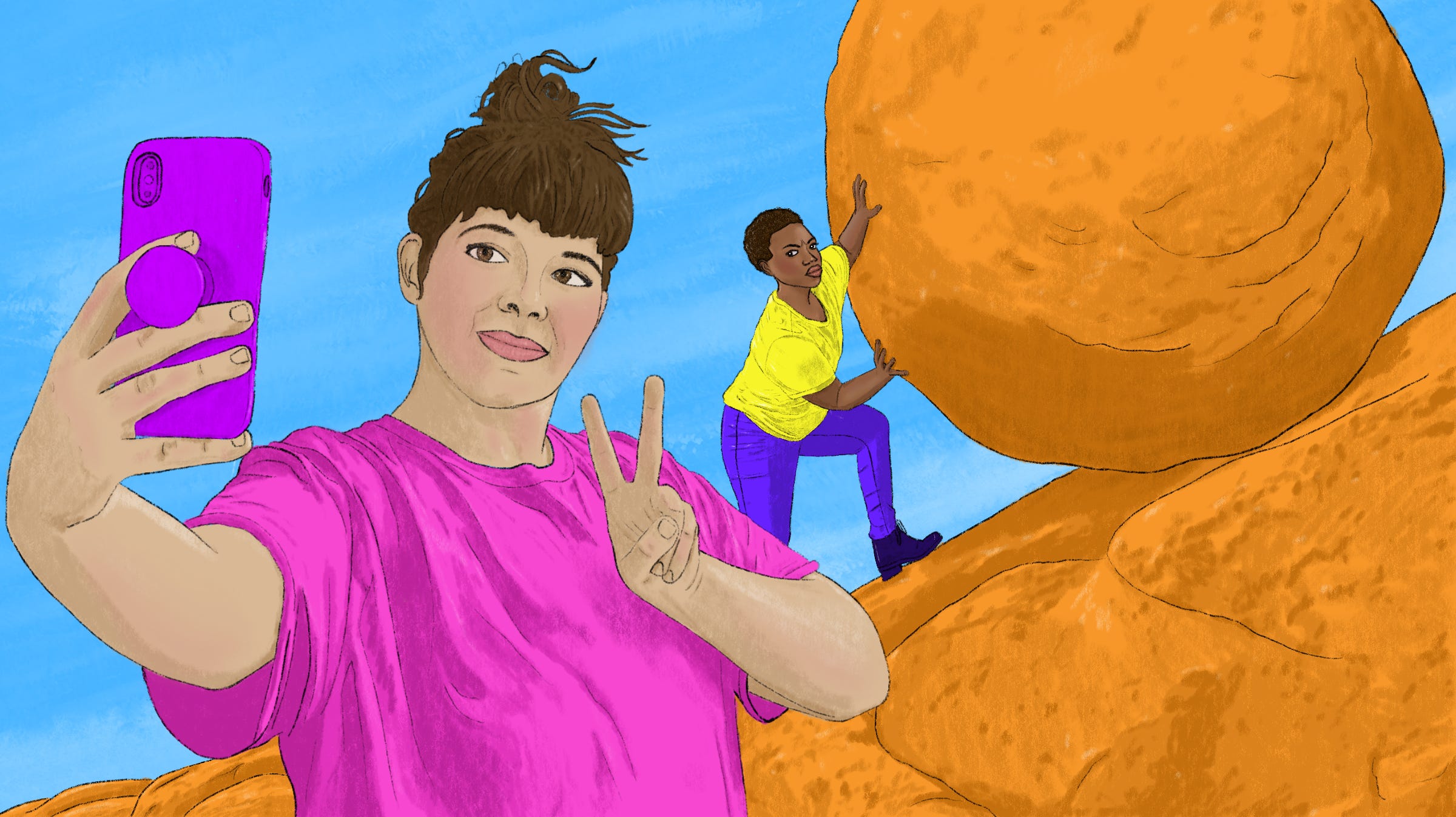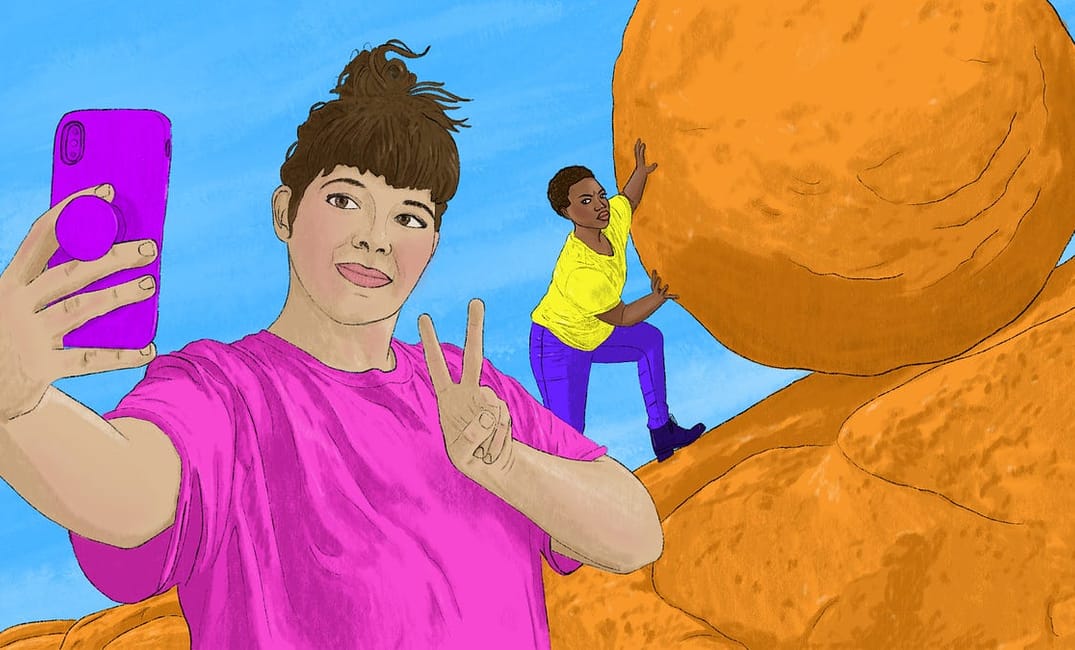
This is not a feel-good inspirational post to reignite your passion for allyship. No, this is reality, as daunting and ugly as it may be.
We all knew it was coming. I’d venture to say every single Black person in America not only knew it was coming but was actively waiting for it to happen. After the black square badge of anti-racism, the allyship die-off was not surprising, nor was it a new experience for us. What was new was Black Lives Matter and social justice going viral. All of a sudden people gave a fuck about us — or acted like they did — because it was trending and the perception of white people teetered on whether they showed public support for Black lives.
Businesses scrambled to photograph Black models to “diversify” their feeds and commercials. White people moved out of the way on the street to let us pass and expressed their condolences.
During this tumultuous time for Black folks in America, it was as if we were supposed to relish in the fact that the whole world was expressing love for us, but the truth was we knew it wouldn’t last. And it didn’t.
Genuine as the Black Lives Matter murals painted on major streets and millions of people protesting around the world may have been, the die-off since then is pure evidence that we are a society that functions on groupthink. That we’re programmed only to do things when other people are doing them or when we perceive it as worthy by the masses. Few people are willing to consistently rub against the grain, bring up conversations about race with family, speak up for co-workers, step back or resign when a BIPOC person is more qualified, or question the status quo. Maybe they could do it for a week, or a few weeks, but six months later? Apparently not.
The ghosted allies are those who spoke out against police brutality and murder, posted videos protesting in the streets, shed tears in their stories, followed as many Black accounts as they could find. This group was, for a moment, utterly shook by the reality of racism. But what they didn’t realize was their bewilderment — their shock — in waking up to what Black people go through every day in this country and have for hundreds of years was what added a real insult to injury. It displayed that they had either not been paying attention, listening to us, or frankly hadn’t given a fuck about us.
In the midst of what was incredibly traumatic and painful, we experienced something we have always wanted, but we knew it would be fleeting if it ever came. That people express love and advocate for us. That they stand on the front lines to protect us. That they speak up and use their privilege to center us. All we’ve ever wanted is to be seen and treated as equal and to have the same access to opportunities as everyone else. That’s it.
We didn’t ask for all of the emotional labor that came our way. The endless DMs asking us to participate in a campaign — for free. Text messages asking us what was okay and not okay to say, to post, to share. Diversity training requests at the workplace. The list goes on. Not to mention the unsolicited Venmo and CashApp donations to “support” Black businesses and creatives felt like money falling from the sky — these guilt-ridden payments ghosted, too.
White folks have an uncanny way of centering themselves even when they aim to decenter. We saw this in the week of “amplify Black voices” on social media when, instead of white voices being silent, they posted to express their stance of silence. Instead of Black voices taking center stage, which was the supposed intent, we spent our time, labor, and energy creating content to explain all the points white people kept missing.
As allies, I get that reality can be daunting, and in a moment of uncertainty and wanting to do something, mistakes are made. I get that you feel like you joined a powerful movement that had all this momentum behind it. The real allies who’ve been around for so long waiting for other white people to “get it” were hopeful. I get that once that boiling water turned to steam and that steam evaporated, there was nothing left in the pot. But instead of finding more water to pour in and start the boil from scratch, people simply turned off the stove and walked away.
The hardest thing to do is the hardest thing to do. To be the odd one out, to have to explain to people why anti-racism matters, to sacrifice something for the good of other people with no intentions of personal gain. I get it.
That’s why the truth is it will be a long time before Black people trust white folks with social justice — if they ever do. It’s too convenient to back out when it gets hard for them. For Black people, too much has been lost, too much pain has been experienced, too much trust has been broken, and too much is at stake. The tight margin in the 2020 election revealed to us yet again how racist this country is and how far we have to go — but it also showed us power in numbers and that Black women and BIPOC will always lead this movement.
You see, we don’t expect white people to come to our rescue, nor do we look for it. We take the lemons we’ve been given and make lemonade like we’ve always done. It’s in our DNA to survive, to make a way out of no way, and to make something out of nothing. We live and breathe that — the creativity it requires of us to do this is why Black culture is the culture.
Our music, our hair, our style, our language, our dances, our athleticism, our curves, our lips, our food. Hip-hop culture informs popular culture worldwide in pretty much every way. People pay to lay in tanning beds, braid their hair, inject their lips and ass, all while denying and erasing their origins in the process.
Everywhere you look, you will see a glimmer of Black culture. What you hear on the radio, the sports your partner watches, the hoop earrings, cool sneakers, the yasssss, the tap in, the everything. Imagine what it’s like to watch people use and profit off your culture and then treat you like a second-class citizen everywhere you go. When you walk into a restaurant and get seated after people who just walked in, when you get pulled over and harassed for no reason, when they drop microaggressions at work, but can rap every lyric of “Bodak Yellow” in the car on the way home.
If only they loved us as much as they love our culture.
If only the time, money, and energy spent co-opting our culture was spent defending us. If only the actions followed the words. If only people unapologetically stood up for Black lives not as a trend but as a way of living.
BIPOC will never leave the work of social justice in the hands of white people, ever. We have and always will be all we got. Yes, we will collaborate. We will join forces for common goals. We will model for brands. Speak on panels. Post on social media. Correct white folks even when we know it’s not our responsibility. And keep fighting the fight. Not because we have superhuman strength, but because our lives and the lives that come after us depend on it. We can’t afford to give up.
So, when white folks say it’s hard, that they’re tired, that they’re feeling anti-racism burnout, I don’t deny that. This shit is exhausting as all hell. The only difference is they haven’t built the resilience that comes with being Black in America. They didn’t grow up hearing stories from their grandmother of white school teachers beating them with switches until they were bloody. They don’t experience the fear of having their fathers, brothers, husbands, or boyfriends getting harassed by police. They don’t spend their days on alert to determine if it’s safe or not to be where they are. They don’t get challenged to move off the sidewalk when they meet a white person on the path. They don’t have to advocate for their well-being in a hospital because the racist staff doesn’t care whether they live or die.
So, when I say BIPOC still can’t trust white people with social justice, this is what I mean.
For allies who keep showing up. For the ones who read this and still feel compelled to keep going, keep going. We don’t need anyone to save the world from racism; we need people to save the world from themselves. Be accountable — practice humility. Build resilience. Take action. Commit to a weekly or monthly anti-racism action. Have conversations at work. Replace as many products as you can with BIPOC owned ones. Notice when you co-opt culture and pivot. Call people in when they’re wrong. Start applying the knowledge from what you’ve been reading, watching, and listening to. It will challenge you. Your resolve will be tested. You will want to go back to what is comfortable and familiar. You’ll want to “take a break,” but just know that adversity is what makes people who they are.
What you’re becoming begins in your actions, and every step reacts. When you understand that fighting racism is an internal job, a series of consistent and unwavering efforts, your transformation can truly begin. You have a role in this movement. Show up even when no one is looking, and no praise is being given. That’s how you earn our trust.
Sign up for The Bold Italic newsletter to get the best of the Bay Area in your inbox every week.







